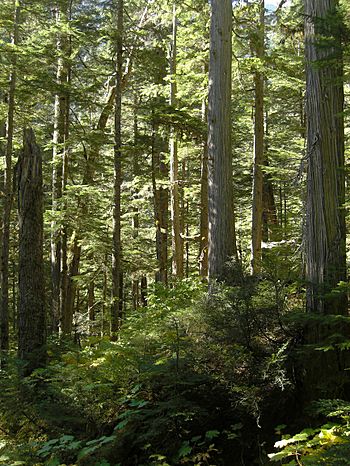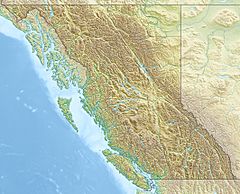Incomappleux River facts for kids
Quick facts for kids Incomappleux River |
|
|---|---|

The inland temperate rainforest of the Incomappleux River Valley
|
|
|
Location in British Columbia
|
|
| Country | Canada |
| Province | British Columbia |
| Physical characteristics | |
| Main source | Illecillewaet Neve Selkirk Mountains |
| River mouth | Columbia River Upper Arrow Lake 50°45′N 117°43′W / 50.750°N 117.717°W |
| Basin features | |
| Progression | Incomappleux Valley |
| Basin size | 1,020 km2 (390 sq mi) |
The Incomappleux River is an important river in British Columbia, Canada. It flows into the Columbia River through a part of Upper Arrow Lake called the Beaton Arm. The upper part of this river valley is special. It is home to a unique inland temperate rainforest. This type of forest is found in very few places around the world.
First Peoples of the Incomappleux
The name "Incomappleux" comes from the Okanagan language. The original word is nk'mapeleqs. This means "point at end (of lake)". It describes the northeastern tip of Upper Arrow Lake. This is where the Incomappleux River joins the lake. The names of a nearby creek and mountain also come from this word. The Sinixt people once had a village here. It was located near where the river meets the lake.
Early European Settlers
When European explorers first arrived, they used different English spellings for the river and valley. Sometimes, they even called it Fish River. Later, several small towns grew in the Beaton Arm area. These pioneer towns included Arrowhead, Beaton, Camborne, Circle City, and Comaplix. Mines in this area were rich in silver lead ore. Some famous mines were Eva, Oyster, and Meridian.
The River's Journey
The Incomappleux River starts high up in the Selkirk Mountains. Its source is near the Illecillewaet Neve on Mount Bonney. This mountain is also where the Illecillewaet River begins. From its source, the Incomappleux River flows mostly south. The river flows through a wild area. Here you can find huge, old cedar and hemlock trees. You might also see plants like devil's club and even bears.
 | Roy Wilkins |
 | John Lewis |
 | Linda Carol Brown |


